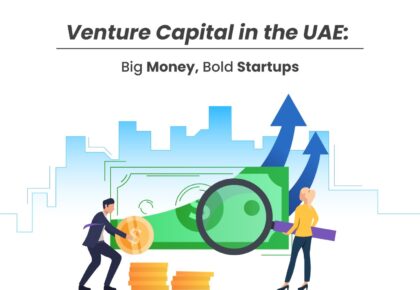
The startup world might look all bright and shiny from the outside, but once you go into it you see there are challenges and failures that come with stepping into this world. One wrong move and success becomes a distant dream.
Not all startups work or become big companies. A whole lot of factors determine whether your startup can make it or not. One of the deciding ones is funding. When looking for startup funding options in the UAE, you’ll find yourself debating bootstrapping vs venture capital for startups.
You must know the benefits and challenges of launching a startup in the UAE. By the end of this blog, you’ll understand the difference between bootstrapping and VC funding your startup and the factors you must consider when choosing one of these options.
What is Bootstrapping?
Simply put, you are funding your startup yourself, investing your savings or money from your family and friends to develop an MVP and launch your business. Here, cashflow management becomes a critical factor in creating successful bootstrapped startups.
The goal is to start selling as soon as possible to cover your expenses. Then, you’ll reinvest the revenue to keep your business running. It is a popular funding alternative in the startup ecosystem in the UAE. Startups often use it to validate their idea before raising external funding.
Benefits of bootstrapping a startup:
- Complete control and ownership of the business
- No intervention in business decision making
- Optimal use of resources and funds
Challenges of bootstrapping a startup:
- Cashflow struggles restrain the operation.
- Limited access to resources and network
- Relatively slower startup growth
What is Venture Capital?
Basically, venture capitalist investors fund companies with high growth potential in exchange for equity in the startup. These inventors often have firms in the UAE.
Venture capital in the UAE is a popular funding option because the firms also offer guidance and support and extend their network to boost the startup’s growth. VC funding is often raised by validated startups that want to expand and grow.
Benefits of venture capital for a startup:
- Access to business expertise and guidance.
- Sufficient capital to boost their growth
- Build a credible brand image by leveraging the image of the VC firm
Challenges of venture capital for a startup:
- Significant equity dilution
- Pressure to perform and earn revenue
- Dispute in decision-making
Bootstrapping vs Venture Capital
As we read above, both bootstrapping and venture capital funding have their perks and drawbacks. Choosing one of these methods of startup funding in the UAE can be tricky. However, understanding a few of the most critical factors related to your startup and its operation can help you decide. The following are a few factors to help you choose the best funding option.
1. Capital requirement of your startup
A significant factor in decision making which can limit your startup funding options. If your startup is in a capital-intensive field such as healthcare, energy, and AI, you might need more capital compared to other niches. Therefore, create a financial projection for your startup and determine how much and how often you’ll need funds.
VC funding is appropriate if you need intensive capital to grow your startup. However, you can opt for bootstrapping if you have strong financial projections and revenue sources with manageable expenses.
2. Decision-making dynamics for a startup
Do you operate in a sector where you need to make quick decisions, or do you need more control over the decision-making dynamics of your startup? Both factors are crucial in choosing one of these startup funding options.
Bootstrapping provides you with the freedom and flexibility to be your boss and make business decisions without any external parties involved. However, with VC funding, you need to ask the board for major decisions. It can delay the decision-making time and may result in conflicts between investors and entrepreneurs. Many VC firms provide great flexibility to the founders. So, do your research when looking for VC funding.
3. Growth rate for the startup
How fast do you want your startup to grow and what resources are required for it? The answer to these questions can impact your funding options. The startup growth rate for bootstrapping is comparatively slow because the funding comes from the revenue after expenses are met. They often do so independently when securing resources and marketing their brand. However, with VC funding, you can access large capital with guidance and a network to boost your sales, leading to rapid growth.
4. Long-term vision
Do you want to grow a sustainable brand with creative freedom or grow in an international market and go public? Both of these have different visions and need different funding methods. Bootstrapping is better if you want to be a self-made, sustainable brand and secure profit for yourself. However, VC funding will benefit you if you expand rapidly and don’t mind diluting some equity.
5. Risk-taking abilities
Both bootstrapping and venture capital funding for startups involve risks. For bootstrapping, the founder takes a risk with their savings and bears the losses. For venture capital funding, the founders are responsible for performing and relying on the investor’s board for decision-making. VC puts their control over their startup.
Whether bootstrapping or looking for VC firms in the UAE, you must network well to build and expand your startup. Startup events, like the International Investors Summit, enable you to connect with investors, industry experts, and mentors. Working with mentors can help you navigate the startup world better if you are bootstrapping. Startups can find reliable VC firms for their startups. Look out for our next IIS event in the UAE, including an expert panel discussion, pitching event, startup exhibition, and more.
Conclusion
If you have ever looked up the bootstrapping or venture capital for startup funding, you might be even more confused about which is better for your startup. So, we discussed the perks and challenges of these startup funding options. The factors affecting your choice are the capital requirement, decision-making dynamics, growth rate, long-term startup vision, and the risk-taking abilities of the startup. If you are looking for rapid growth and direct access to expert guidance, VC funding can help. Bootstrapping will be ideal for you if you need more freedom and steady, slow growth.
FAQs
1. How to raise capital for a startup in the UAE?
There are many startup funding options in the UAE, ranging from equity-based angel funding and venture capital to debt and equity-free options such as bootstrapping and government grants. Many high-priority sectors, such as agriculture, tech, and energy, receive great incentives and support from the UAE government. You can attend the startup exhibitions to establish your brand and raise funds. Startup events such as IIS can help you connect with investors and build your network in the UAE.
2. How to find VC firms in the UAE?
You can find reliable VC firms in the UAE through social media, networking, and startup events. Some popular VC firms investing in UAE startups are BECO Capital, Global Ventures, Wamda Capital, EQ2 Ventures, Shorooq Partners, and Detec Ventures.
3. What is the difference between bootstrapping and venture capital funding?
The primary difference between bootstrapping and VC funding is the source of funds. For bootstrapping, a founder funds the startup and uses the revenue to keep the startup afloat. For VC funding, the VC firms provide the capital and guidance in return for equity. The VC funding is ideal for rapid expansion and growth, but it limits decision-making freedom. With bootstrapping, you retain control but may find securing sufficient resources and access to the market challenging.
4. What is hybrid funding for startups?
The startups use a combination of equity-free and equity-based funding methods in the hybrid funding method. For example, startups may start with bootstrapping and, later in the growth stage, may opt for external funding if needed.







